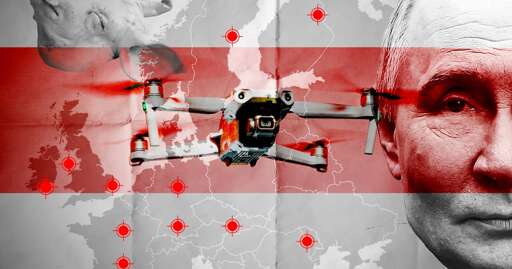cross-posted from: https://lemmy.sdf.org/post/44874787
[…]
Provocative stunts targeting Jewish and Muslim communities [across Europe] are among a range of incidents – ranging from the bizarre to the potentially lethal – that police investigations in European countries have tracked back to Russia.
They span graffiti campaigns in Paris; the burning of a Warsaw shopping centre and a warehouse in London; exploding parcels in Leipzig and Birmingham; the sabotage of railway lines in Germany; cyberattacks and doctored viral videos across Europe; to the recent disruption of airports with drones in Norway, Denmark and Munich.
As their frequency has multiplied in recent years, European police, governments, and intelligence services have begun openly sharing the evidence they find to suggest the incidents are part of a Russian “hybrid war”: an attempt to foster instability and division in European societies, while burdening and distracting governments that are supportive of Ukraine.
The aim is “to disrupt the unity of Western states and sow discord among the citizens of European countries,” reads a report on the issue by the Czech intelligence service.
“The psychological effect of their actions is particularly crucial. This is the weakening of the cohesion of western society, the instillation of fear and uncertainty, the undermining of trust in one’s own state that it can protect its citizens, and the aforementioned pressure to limit support for Ukraine.”
[…]
The long chain of recruitment separating those paying for the attacks and the sometimes unwitting perpetrators can make attribution difficult. This is deliberate, according to those who study Russian warfare.
“By doing this, you avoid direct accusations. You say: no, no, it’s not us. Hybrid attacks are perfect for this,” Christo Atanasov Kostov, an adjunct professor at IE University currently conducting research into Russian-backed disinformation in eastern Europe.
The fear and uncertainty such attacks can produce, with people divided about whether or not Russia could be responsible, is also the point, analysts say.
“They are signalling clearly to governments that this is a Russian capability that the Kremlin is willing to use,” said Stefan Wolff, professor of international security at the University of Birmingham.
“But at the public level, there’s enough doubt that pro-Russian actors can say: look at our governments, they are incapable of protecting us properly, they are just needlessly blaming the Russians.”
[…]
The Valdai Discussion Club, a think tank with close ties to the Russian government that hosts a talk by president Vladimir Putin each year, recently released its annual report, called Dr. Chaos or: How to Stop Worrying and Love the Disorder.
The report writes that wars may now have a “changing purpose”, which is “maintaining a balance” with other powers – constant disorder, instead of outright victory.
“Russia, it’s a really big country, but if you look at the population and the size of the economy, I think they do realise that they cannot ‘win’ in a more traditional sense of winning,” said Wolff.
“So all they need to do is have this permanent state of uncertainty and volatility. For that, they have enough capability.”


